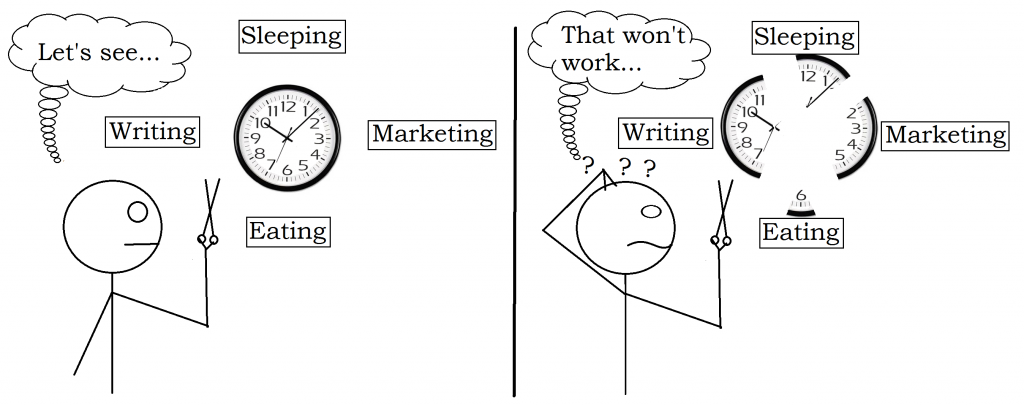A long time ago, in a writing and publishing galaxy far, far away, authors could write all the time and the publisher would do all the marketing. Not any more. These days, authors must do their own marketing.
But who has time for that?
 Well, you’d better make time for it. Somehow. Sure, you want to spend your precious time writing and you don’t like marketing. That’s why you became a writer. Still, it turns out that your preferences don’t really enter into this—you must do most of your own marketing (or pay someone to do it for you).
Well, you’d better make time for it. Somehow. Sure, you want to spend your precious time writing and you don’t like marketing. That’s why you became a writer. Still, it turns out that your preferences don’t really enter into this—you must do most of your own marketing (or pay someone to do it for you).
Let’s assume you’re done grumbling about that fact and have reached acceptance. You know you must spend some time marketing, and now it’s just a question of how much.
After all, marketing does consume time. Book marketing activities include blogging, blog tours, author interviews, arranging for reviews, book signings, podcasts, social media, and making promotional videos.
How are you going to balance all that with your writing? Let’s take two extreme examples, those of authors Ty Prighter and Mark Etter.
- Ty Prighter wrote all the time. He disdained marketing and refused to devote any time to it. After all, he said, that’s the publisher’s business. Ty believed the more he wrote the better author he’d become; if he became skilled enough, readers would find his books and want more. His books would market themselves.
- Mark Etter wrote one book. He got so busy marketing it, he had no time to write another. He enjoyed the social interaction of marketing. Mark discovered which marketing methods worked best for him, and ceased the ineffective ones and focused on those that increased sales.
Which of these authors was more successful? Actually, neither writer practiced a good time management strategy.
It was a long time before readers noticed Ty’s books. He did improve his writing, thanks to the time he spent doing it, but improvement was slow due to the lack of reader feedback. He missed out on a lot of sales he could have had if he’d reached out to readers early.
As for Mark, his book did sell, but some of his readers wanted more. He had no more. Popularity of his one book didn’t rise as high as it might have, had there been a sequel, or at least other books written by that author.
Ty and Mark are fictitious examples, of course. For you, in the real world, it’s going to take a balance. More than that, you’ll have to experiment to find the optimal split of time for you between writing and marketing. You may have to force yourself to do the marketing activities, or you may learn to enjoy them.
I wish I could offer you a numerical percentage of time that has worked for me. However, I’m much closer to the Ty Prighter end of the scale. I don’t spend much time marketing, other than blogging. I do enjoy that, but the effect of blogging on sales of my books has been lackluster. I’m working toward a better balance of marketing and writing time, but it’s difficult.
May the force be with you as you figure out your proper time balance. Once you do, consider sharing your wisdom, and leave a comment for—
Poseidon’s Scribe

